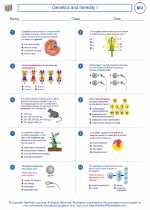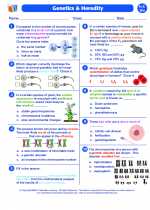Pituitary Gland
The pituitary gland, also known as the hypophysis, is a small, pea-sized gland located at the base of the brain. It is often referred to as the "master gland" because it plays a crucial role in regulating and controlling the functions of other endocrine glands in the body.
Anatomy of the Pituitary Gland
The pituitary gland is divided into two main parts: the anterior pituitary (adenohypophysis) and the posterior pituitary (neurohypophysis). The anterior pituitary is connected to the hypothalamus by a network of blood vessels called the hypophyseal portal system. The posterior pituitary is an extension of the hypothalamus and stores hormones produced by the hypothalamus.
Function of the Pituitary Gland
The pituitary gland produces and releases several important hormones that regulate various bodily functions, including growth, reproduction, metabolism, and stress response. Some of the key hormones produced by the pituitary gland include:
- Adrenocorticotropic hormone (ACTH): Stimulates the adrenal glands to produce cortisol, which helps the body respond to stress.
- Thyroid-stimulating hormone (TSH): Stimulates the thyroid gland to produce thyroid hormones, which regulate metabolism.
- Growth hormone (GH): Promotes growth and development of tissues and organs.
- Prolactin: Stimulates milk production in the mammary glands.
- Follicle-stimulating hormone (FSH) and luteinizing hormone (LH): Regulate the reproductive system and sex hormone production.
- Antidiuretic hormone (ADH) and oxytocin: Produced in the hypothalamus and stored in the posterior pituitary, these hormones regulate water balance and uterine contractions during childbirth, respectively.
Disorders of the Pituitary Gland
Disorders of the pituitary gland can lead to either overproduction or underproduction of hormones, resulting in various health problems. Some common pituitary disorders include:
- Acromegaly: Overproduction of growth hormone in adulthood, leading to enlarged body parts and other health issues.
- Hyperprolactinemia: Overproduction of prolactin, which can cause infertility, irregular menstruation, and milk production in non-pregnant individuals.
- Hypopituitarism: Underproduction of pituitary hormones, leading to symptoms such as fatigue, weight loss or gain, and decreased libido.
- Diabetes insipidus: Insufficient production of ADH, resulting in excessive urination and thirst.
Study Guide
When studying the pituitary gland, it's important to understand its anatomy, function, and the hormones it produces. Here are some key points to focus on:
- Describe the structure of the pituitary gland and its two main parts.
- Explain the role of the pituitary gland as the "master gland" in regulating other endocrine glands.
- Identify the hormones produced by the anterior and posterior pituitary, and their respective functions in the body.
- Discuss the feedback mechanisms that control the secretion of pituitary hormones.
- Compare and contrast the disorders associated with the pituitary gland and their potential causes and symptoms.
Understanding the intricacies of the pituitary gland and its hormonal control is essential for comprehending the broader functioning of the endocrine system and its impact on overall health and homeostasis.
.◂Biology Worksheets and Study Guides High School. Genetics and heredity I

 Worksheet/Answer key
Worksheet/Answer key
 Worksheet/Answer key
Worksheet/Answer key
 Worksheet/Answer key
Worksheet/Answer key
 Vocabulary/Answer key
Vocabulary/Answer key
 Vocabulary/Answer key
Vocabulary/Answer key
 Vocabulary/Answer key
Vocabulary/Answer key
 Vocabulary/Answer key
Vocabulary/Answer key
 Vocabulary/Answer key
Vocabulary/Answer key
 Vocabulary/Answer key
Vocabulary/Answer key
 Vocabulary/Answer key
Vocabulary/Answer key
